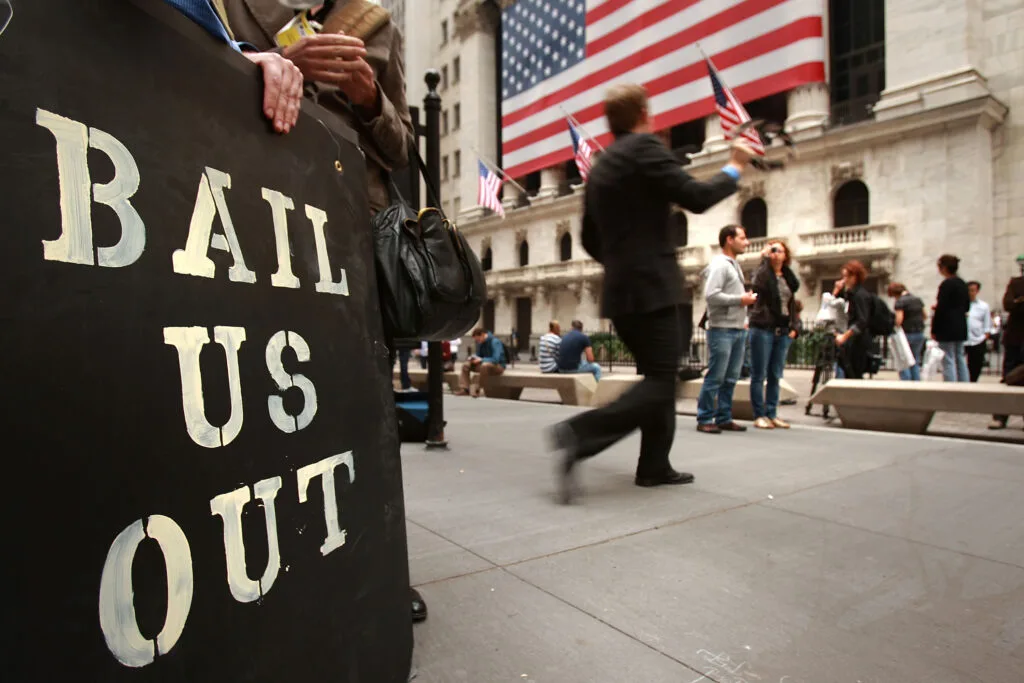The Great Recession and Its Continuing Impact: 8 Docs to Watch

September 30, 2019
Share
It was the biggest bank failure in American history: On September 25, 2008, the federal government took over Washington Mutual, selling the majority of the enormous savings and loan provider’s assets for $1.9 billion to JPMorgan Chase.
Washington Mutual’s collapse was just one link in the dramatic chain of events surrounding the largest financial crisis since the Great Depression — a crisis that cost trillions in household wealth, and that experts say led to heightened economic inequality.
More than a decade after the 2007-08 crisis, revisit FRONTLINE’s reporting on the Great Recession — from how the country’s leaders struggled to respond to an economic crisis that caught them by surprise, to why Wall Street’s leaders have escaped criminal prosecution for their role in the meltdown, and how the impact of the crisis and the massive government bailout have continued to reverberate.
1.) Inside the Meltdown (2009)
From the Bear Stearns deal, to Lehman Brothers’ collapse, to the propping up of insurance giant AIG, to the $700-billion bailout, this documentary from Michael Kirk and his team chronicled key moments in the crisis — and how the government responded.
2.) Breaking the Bank (2009)
The bets were huge and risky: billions of dollars on the housing market. The upside was undeniable: superbanks reaped billions of dollars, dominated the landscape, and gobbled up competitors. Then, the bottom dropped out. In Breaking the Bank, Kirk and his team untangled the complicated financial and political web threatening one particular superbank: Bank of America.
3.) The Warning (2009)
Looking back to the 1990s, Kirk and his team discovered early warnings of the crash, and uncovered a concerted effort not to regulate the emerging, highly complex, and lucrative derivatives markets — which would become a ticking time-bomb within the American economy.
4.) Money, Power and Wall Street (2013)
In this Polk- and Emmy Award-winning four-hour investigation of the global financial crisis, FRONTLINE told the inside story of the struggles to rescue and repair a shattered economy — exploring key decisions, missed opportunities, and the unprecedented and uneasy partnership between government leaders and titans of finance that would affect the fortunes of millions of people around the world. From Michael Kirk, Jim Gilmore, Mike Wiser, Marcela Gaviria and Martin Smith, the series probed deeply into the story of the big banks — how they developed, how they profited, and how the model that produced unfathomable wealth planted the seeds of financial destruction. It also explored how President Barack Obama inherited a financial crisis that would challenge his administration, dividing his economic team over how tough the White House should be on the banks that were at the heart of the crisis.
5.) The Untouchables (2013)
Five years after the crisis, Martin Smith investigated why Wall Street’s leaders escaped criminal prosecution for any fraud related to the sale of bad mortgages. The film featured a tough interview with Lanny Breuer, then the head of the Justice Department’s criminal division, who had led the effort to pursue allegations of fraud and corruption at major banks in the wake of the financial meltdown. Breuer told Smith that financial fraud had not gone unpunished, but that greed wasn’t necessarily criminal.
6.) Abacus: Small Enough to Jail (2017)
As The Untouchables explored, executives at the biggest banks on Wall Street all avoided prosecution for fraud related to the sale of bad mortgages. But several years after the financial crash, a small community bank in New York City’s Chinatown was accused of mortgage fraud by the Manhattan District Attorney’s Office — making Abacus Federal Savings the only U.S. bank to be prosecuted in relation to the financial collapse, and the first bank indicted in New York since 1991. Why did Abacus face charges, while the big banks on Wall Street got bailouts? That’s the question at the heart of this Oscar- and Emmy-nominated feature-length documentary from director Steve James.
7.) Left Behind America (2018)
In the decade after the Great Recession, many American cities and towns bounced back. But for some small and mid-size cities that were once hubs for innovation and manufacturing, economic recovery remained elusive. In Left Behind America, FRONTLINE, ProPublica, and WNET’s Chasing the Dream asked why — and presented an in-depth look at one such city, Dayton, Ohio, whose citizens continued to fight for economic revitalization 10 years after the financial crisis.
8.) The Pension Gamble (2018)
FRONTLINE’s examination of the U.S. economy continued with The Pension Gamble, a documentary from Martin Smith and Marcela Gaviria investigating how state governments and Wall Street led America’s public pensions into a $4-trillion hole. In particular, the film focused on the volatile fight over pensions in Kentucky — where the public pension system made risky bets on Wall Street to try to dig out from under the 2008 crash, only to become even more dramatically underfunded.
These documentaries — and hundreds more — are available for streaming at pbs.org/frontline and on the PBS Video App. This post has been updated.

Latest Documentaries
Explore
Policies
Teacher Center
Funding for FRONTLINE is provided through the support of PBS viewers and by the Corporation for Public Broadcasting, with major support from Ford Foundation. Additional funding is provided the Abrams Foundation, Park Foundation, John D. and Catherine T. MacArthur Foundation, Heising-Simons Foundation, and the FRONTLINE Trust, with major support from Jon and Jo Ann Hagler on behalf of the Jon L. Hagler Foundation, and additional support from Koo and Patricia Yuen. FRONTLINE is a registered trademark of WGBH Educational Foundation. Web Site Copyright ©1995-2025 WGBH Educational Foundation. PBS is a 501(c)(3) not-for-profit organization.



















